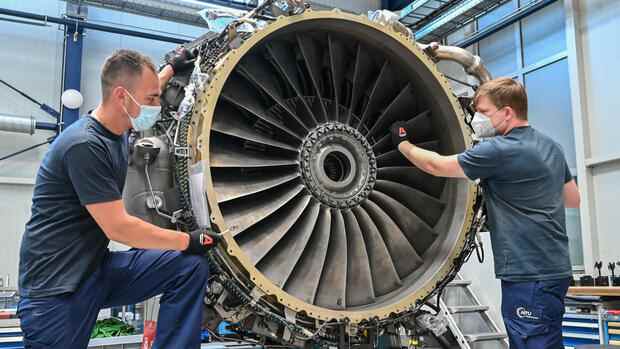The Dax group MTU is investing heavily in the research and development of hydrogen engines for aircraft.
(Photo: dpa)
Frankfurt Munich-based engine specialist MTU is speeding up the development of sustainable aircraft engines. In the first half of 2022, the company invested 135 million euros in research and development, 32 percent more than in the first half of the previous year. This emerges from the half-year report that the company published on Wednesday morning.
Among other things, the money goes into studies with which the Dax group wants to research and develop future drives with hydrogen and flying fuel cells. The high level of research and development expenditure proves “that we are investing in the future of sustainable, emission-free aviation and thus in the future of MTU,” said CEO Reiner Winkler. At the end of the year, Winkler hands over management of the company to CTO Lars Wagner.
Aviation is under great pressure when it comes to climate protection. The EU Commission is working on strict emission targets. However, alternatives to combustion engines are rare in aviation. For the time being, the use of batteries in larger commercial aircraft is not possible due to a lack of sufficient power. That’s why companies like MTU or Airbus rely on hydrogen. But it will be many years before such drives are approved and marketable. With the investments, MTU is making a certain bet on the future.
The company can afford it. Operating profit soared by 53 percent to EUR 290 million in the first six months. The profit margin is 11.5 percent. Sales increased by 23 percent to 2.47 billion euros. “Market data such as the development of traffic figures in the passenger and freight sectors and the demand for new aircraft point to a sustained recovery in our industry,” says CEO Winkler confidently.
Top jobs of the day
Find the best jobs now and
be notified by email.
Airbus and Boeing expect strong aircraft demand
The two major aircraft manufacturers Airbus and Boeing recently updated their long-term forecasts for the aircraft market. Boeing expects to deliver 41,170 passenger and cargo planes worldwide over the next two decades. Rival Airbus – MTU supplies engine components for its short- and medium-haul jet A320 – calculates that it will need 39,490 aircraft by 2041.
To this end, Airbus intends to significantly increase production of the A320 family. The goals are ambitious. 50 aircraft are currently being built each month, and by next summer it should be 65, more than ever before. For 2025, the aircraft manufacturer is even aiming for 75 jets per month.
But that’s too fast for suppliers like engine manufacturer Pratt & Whitney. The company announced a few days ago that it would not be possible to ramp up its own production until 2026. Airbus already has aircraft that are basically finished but cannot be delivered due to a lack of engines.
A delayed start-up of the engines would also affect MTU. The company produces low-pressure turbines and compressors. Both are installed in jet engines such as the Pratt & Whitney PW1100G-JM engine. MTU-Winkler emphasized that they are prepared for an increase in production figures. “We see ourselves in a position to cope with this ramp-up. The supply chains are strained, but ours are stable because we are always multi-track.”
A decision by the federal government is disrupting business
The second major division is the maintenance of these engines. There is also a military shop. For example, MTU is involved in the planned European air combat system FCAS. In the military business, a decision by the federal government has spoiled MTU’s good business prospects.
The company had to make a value adjustment of 24 million euros. The reason: the Bundeswehr should not get the Sikorsky King Stallion helicopter, but the Boeing Chinook. MTU is involved in the drive of the Sikorsky, but not in that of the Chinook.
Nevertheless, MTU confirms the previous forecast. According to this, sales in the current year should amount to 5.2 to 5.4 billion euros. Adjusted operating income before interest and taxes is expected to increase in the “mid-twenties percentage range.” Things are also looking good for the next few years. MTU was able to collect orders worth 600 million US dollars at the Farnborough Air Show. The order backlog is thus at the previous record level of 24.56 billion euros.
More: “Historical day for aviation” – Airbus puts pressure on the hydrogen jet
